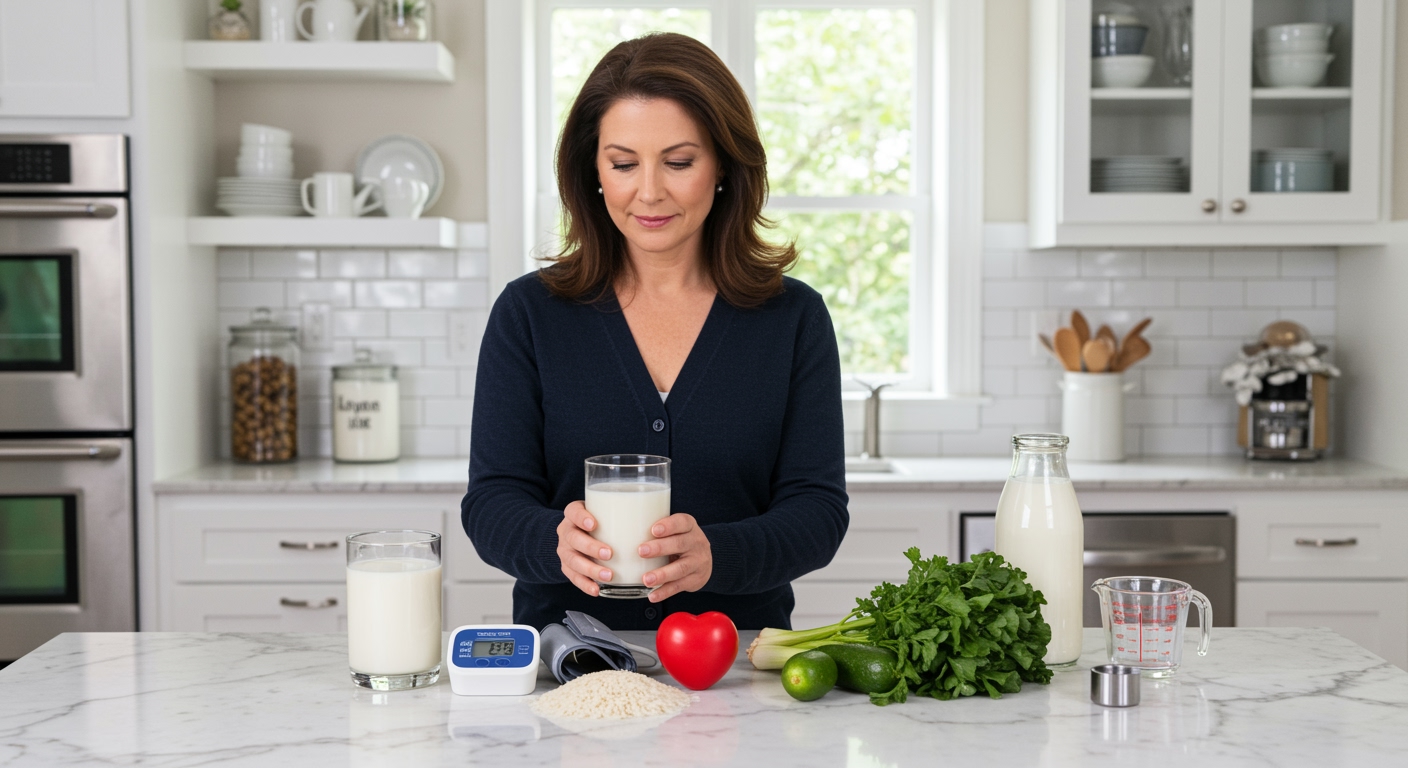✪ Key Takeaway: Rice milk may help lower blood pressure due to its low sodium content and absence of cholesterol.
Introduction
Your morning cereal choice might be secretly affecting your blood pressure in ways you never imagined.
You probably switched to rice milk for lactose intolerance or taste preferences, but now you wonder if this plant-based alternative impacts your cardiovascular health.
Hi, I’m Abdur, your nutrition coach and today I’m going to explain exactly how rice milk affects your blood pressure and what this means for your heart health.
What Makes Rice Milk Different From Regular Milk?
Rice milk contains zero cholesterol and significantly less sodium than dairy milk.
One cup of rice milk typically contains only 90-100 milligrams of sodium, while whole dairy milk contains about 120 milligrams.
This lower sodium content directly benefits people with high blood pressure because excess sodium causes your body to retain water.
When your body holds extra water, your blood volume increases and puts more pressure on your artery walls.
Rice milk also lacks the saturated fats found in dairy products that can contribute to arterial stiffness over time.
The absence of these problematic compounds makes rice milk a heart-friendly alternative for people managing blood pressure issues.
✪ Fact: Rice milk contains about 25% less sodium than regular dairy milk per serving.
How Does Rice Milk Actually Lower Blood Pressure?
The mechanism behind rice milk’s blood pressure benefits involves multiple pathways in your cardiovascular system.
First, the reduced sodium intake helps your kidneys eliminate excess water more efficiently through a process called diuresis.
When your kidneys remove this extra fluid, your blood volume decreases and reduces the pressure against your artery walls.
Second, rice milk contains natural compounds like gamma-oryzanol that may help relax blood vessels.
These compounds work by supporting the production of nitric oxide, a molecule that signals your blood vessels to widen and improve blood flow.
Additionally, the absence of dairy proteins eliminates potential inflammatory responses that some people experience with regular milk.
Chronic inflammation can damage your blood vessels and contribute to elevated blood pressure over time.
✪ Pro Tip: Choose unsweetened rice milk to avoid added sugars that can counteract blood pressure benefits.
What About The Sugar Content In Rice Milk?
Rice milk naturally contains more carbohydrates and sugars than other plant-based milk alternatives.
One cup typically provides 22-25 grams of carbohydrates, with about 10-13 grams coming from natural sugars.
These sugars can cause blood glucose spikes that may temporarily affect blood pressure in sensitive individuals.
When your blood sugar rises rapidly, your body releases hormones like adrenaline that can temporarily increase heart rate and blood pressure.
However, this effect is usually short-lived and less problematic than the long-term benefits of reduced sodium intake.
People with diabetes or insulin resistance should monitor their response to rice milk more carefully.
The key is choosing unsweetened varieties and consuming rice milk as part of balanced meals that include protein and healthy fats to slow sugar absorption.
✪ Note: Pair rice milk with protein-rich foods to minimize blood sugar spikes and maximize heart benefits.
Should You Switch To Rice Milk For Blood Pressure?
The decision to switch depends on your current blood pressure status and overall dietary pattern.
If you already have high blood pressure or prehypertension, rice milk can be a beneficial part of a heart-healthy diet.
The DASH diet (Dietary Approaches to Stop Hypertension) recommends limiting sodium and choosing low-fat dairy alternatives.
Rice milk fits perfectly into this framework by providing calcium and other nutrients without excess sodium or saturated fat.
However, rice milk should not be your only strategy for managing blood pressure.
You still need to focus on reducing overall sodium intake, increasing potassium-rich foods, maintaining healthy weight, and staying physically active.
Consider rice milk as one piece of a comprehensive approach rather than a magic solution for blood pressure problems.
✪ Pro Tip: Combine rice milk with other heart-healthy changes like reducing processed foods for maximum blood pressure benefits.
The Bottom Line
Rice milk can indeed help lower blood pressure through its low sodium content, absence of cholesterol, and potential vessel-relaxing compounds.
Small dietary changes create big health transformations when you make them consistently over time.
I would love to hear about your experience with rice milk or any questions you have about managing blood pressure naturally, so please share your thoughts in the comments below.
References
At NutritionCrown, we use quality and credible sources to ensure our content is accurate and trustworthy. Below are the sources referenced in creating this article:
- Pune Cardiologist: Is Rice Good for High Blood Pressure
- PMC: Dietary Approaches and Blood Pressure
- PMC: Plant-Based Diets and Cardiovascular Health





